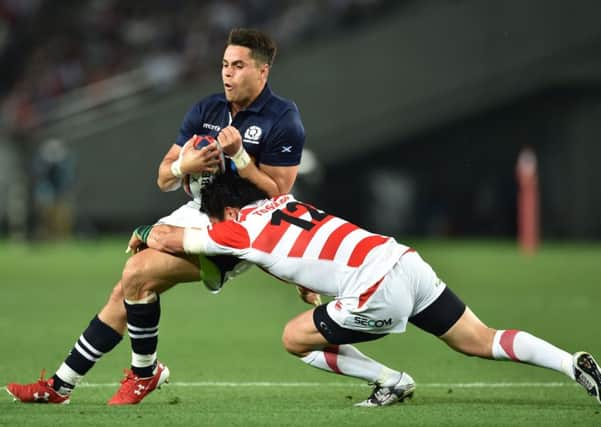Analysis: Scotland's lack of strength in depth exposed by Japan


Scotland’s problems were clear yesterday and sadly they are much the same mistakes they were making back in January when the Six Nations kicked off. They found it almost impossible to string the phases together because almost every player in blue was guilty of losing the ball in contact. The players taped their fingers to help them catch the ball; they might want their money back.
Both teams like to play a similar style of high tempo, multi-phase play which, if it’s done well, can stop the opposition’s line speed so giving the attacking team an extra second and an extra yard to weave their attacking magic. Scotland’s problem is that Japan were better at it than they were. The Brave Blossoms made mistakes, especially in the second half when they had heaps of possession, but they were more accurate with their passing and they held on to the ball longer than the Scots did, a lot longer. One Japanese attack lasted 26 phases which is approximately 25 more than Scotland managed.
Advertisement
Hide AdAdvertisement
Hide AdThe home side also scored the best try of the match, one of the tries of the season, one of the tries of any season, which started with a lineout five metres from their own touch line.
Their breakdown work was slicker and their runners hit the line at pace which caused multiple breaks in the Scots defensive line. Had the Japanese finished off all their half chances they would have won with something to spare, especially in the second half when there was space in the wide channels, but the Blossoms lacked the strike runners to use it.
It wasn’t a happy evening for those Scots getting a rare start at this level. In his defence Scotland’s phase play was almost non existent but Ruaridh Jackson didn’t make much happen at stand-off. After scoring four tries against Japan in the World Cup, Scotland’s two tries in these two Tests both came when Japan were short handed. Yesterday, Scotland failed to score a single try in the full 80 minutes, which suggests that Finn Russell won’t be losing much sleep over the summer.
Rory Sutherland struggled in the set scrum and flanker-turned-hooker Stuart McInally struggled at the sidelines. He overcooked one attacking lineout throw, which Scotland lost, and undercooked another, which Scotland won. When Scotland earned a priceless attacking lineout five metres out the hooker’s throw was both short and squint to give Japan an easy out.
All three front row forwards were hooked at half-time.
Cotter has made a point of sticking to his expansive game plan regardless of the opposition. He has set his stall out and stuck to his guns but you have to wonder if a little tinkering with the tactics might have yielded a more emphatic result yesterday.
A tighter, slower, set piece-orientated game plan would surely have suited the Scots more than their hosts. Throughout the entire match I can only recall Scotland driving one lineout, early in the second half, and it almost resulted in a try for Willem Nel for the second game in succession.
It wasn’t until the last half hour that Scotland got their tactics and personnel right. Nel won scrum penalties, Stuart Hogg kicked long and Greig Laidlaw kicked points.
Since tactics were going to be crucial it was odd that Cotter started his master tactician on the substitutes’ bench until the 50th minute. It is no coincidence that the Scots only edged ahead in the final quarter with Laidlaw pulling the strings.
If Cotter was testing the depth of his Scotland squad he didn’t get the answer he was looking for.